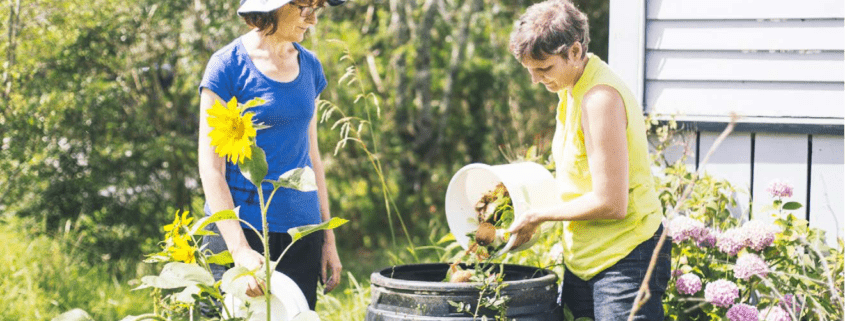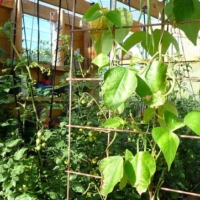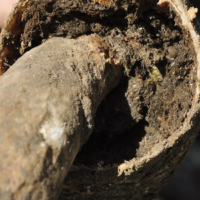An Urban Farm Grows Community
Harvest Article – Autumn 2018
Some innovative projects in Auckland are introducing healthy food-growing practices to new audiences. One of them is Katrina’s Kitchen Garden, an urban biodynamic farm operating out of West Auckland. Co-director Katrina Wolff tells their story.
People find biodynamics in different ways. I came to it through a reading group I belonged to when my children were at the local Steiner school here in Titirangi. Peter Bollen hosted the reading group; he also hosted biodynamic 500 stirs at his house. From there, I gained an insight into this method of gardening.
I was thrilled to later meet local biodynamic guides: Lis Alington, then Diane de Saint-Quentin, and later Simon Harmer. The more I learned, the more I wanted to learn. Attending the Biodynamic Conference in 2016 was further confirmation that this was the correct direction for my future. I find a lot of the Steiner school community here in Titirangi is similar to where I was – dedicated to the Waldorf educational philosophy, and highly curious about what else Steiner said. The gardens of these households are generally treated organically, and there is a value placed on learning to grow food, as well as teaching young people to appreciate homegrown food. It’s a community that wants to eat seasonally, and embraces the vision of eating locally. A couple of barriers to this in Titirangi are the clay soil, and the lack of light for those living surrounded by bush. The lack of light is really hard to overcome, and many people adopt a ‘summer garden’ approach, and don’t attempt too much in the winter months. Composting is thankfully something that can happen year-round in little light. We have gotten around the clay soil issue by building up the soil. We use the hugelkultur method to do this at low cost.
We are primarily an urban farm offering training to a wide range of people. The produce we grow is sold to our local community in the style of Community Supported Agriculture (CSA).
Katrina Wolff
There is another barrier prevalent in society today, and that is a lack of confidence or knowledge. It seems to me that gardening has skipped a generation or two. Many of our customers talk fondly of grandparents who were able to feed themselves – well before self-su”ciency became a trendy aspiration. What happened after this? Supermarkets got bigger, food distribution systems became sophisticated, produce became available for purchase all year round, and we favoured increased leisure time or work time over tending a vegetable garden.
We are seeing a change in this trend now. So many initiatives are popping up connected with food justice or food security. For the Love of Bees, Whenua Warrior, Kai Auckland, KaiCycle, Kaipatiki, Love Food Hate Waste – the list could go on and on. We are primarily an urban farm o!ering training to a wide range of people. The produce we grow is sold to our local community in the style of Community Supported Agriculture (CSA). We also sell seedlings, which people can use to grow their own food. In the interests of helping people grow their own food, we offer a foodscaping service. To make our soil from scratch on site, we collect food waste, garden waste, and other materials from our local community, thus creating a closed loop food production system. The land we use is spread over a number of properties – all urban homeowners who wish to support our vision of creating a local food culture. The parallel but equally important vision is to create jobs for young people with learning di”culties, at the living wage or higher.
Katrina’s Kitchen Garden is unique in that the biodynamic approach is integral to what we do and teach. There have been surprisingly few objections to this approach, and it is really just the ‘stinky’ cow manure that can put some people o!. The time it takes to devote to stirring water can puzzle people, but on the whole I meet fascination and acceptance. It seems to me that people are drawn to the very fact that it’s inexplicable. I feel our society is sometimes missing a sense of magic in our lives. We have scientific analyses of what we eat, how we think, what vegetables are high in which vitamins or minerals. For me, there is comfort in trusting that the moon’s influence is significant, and to let that celestial body inform us, as a body that has far more strength and power than Google or Wikipedia can ever have. We are descended from people who looked up to the stars for guidance, and I think many of us find comfort in reaching out to the cosmos in our lives still today.
Our biodynamic processes on the urban farm are centred around compost making, regular use of CPP (cow pat pit) with seedlings, and regular 500 stirs. Thanks to a workshop with Tony Hudson and Sarah Smuts-Kennedy in August last year, CPP is now being made on site. We grow valerian, chamomile, yarrow, nettle, dandelion and oak, and we are striving towards gathering the animal components needed to make our own compost preparations from scratch. This would save money and also get us closer to the ideal of becoming a self contained farm. As soon as I can get hold of cow horns, we will make the 500 here on the urban farm. More important than the technical processes to me is my inner work. I strive to stay grounded, to feel into what the plants are ‘saying’, what the soil is showing me. I use the biodynamic calendar too, as an indicator of what is happening in the cosmos that I should listen to. I’ve participated in an anthroposophical plant study group and found the drawing and painting exercises extremely useful in deepening my perceptions to allow subtle changes to inform my next steps. Meditation is an essential part of my day.
The land we use is spread over a number of properties – all urban homeowners who wish to support our vision of creating a local food culture.
Katrina Wollf
I am encountering people in my street, the wider community, and even online who are overjoyed at what we are doing. The closed-loop urban biodynamic farm model brings a vision of hope for a new way of working, a new way of forming community ties. Auckland City is one of the most unaffordable places to live in the world, and it seems that if the land is so highly valued, it ought to be better used – for growing flowers for bees, food for humans, or regenerating soil through composting. I suspect that the generosity of the homeowners we meet is an expression of their desires to see their land used well.
Auckland City has the aspiration to be zero waste by 2040, and creating closed loop urban biodynamic farms will help this. Half of current landfill is compostable waste.
For people who aren’t composting food waste, we must find ways to help divert this material from landfill by combining our skills. I am seeing neighbours meet and greet each other, kids playing in each others’ gardens, plants being shared, seeds being swapped, and gardening secrets from prior generations shared with new gardeners. As my co-director Steve McCarthy says, we are seeing something else created – not just Community Supported Agriculture, but Agriculture Supported Community. Neighbours meet for the first time; gardening tips are exchanged on the street while walking dogs. There are shared meals and biodynamic stirs. Building skills, engineering tips, logo design and business development skills are shared within the community.
In his lecture cycle World Economy, Steiner touches on what is referred to as associative economics, and an ‘objective community spirit’ that arises out of mutual economic exchanges. Our CLUB Farm (Closed Loop Urban Biodynamics) is the prototype for a model we will replicate, and we will also support others to create their own CLUB Farms – both in New Zealand and internationally. We have a Facebook group dedicated to Club Farming collaboration, support and sharing of ideas. I welcome new members to this group, and see it becoming a platform for discussion of a new form of food production and distribution, which also values organic waste and builds community



